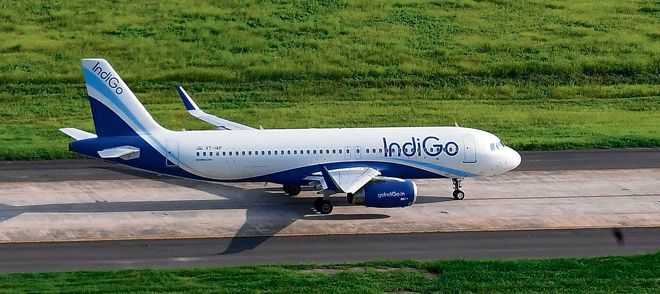
Woes: Indigo, currently the largest player, is beset with corporate governance issues, which have been referred to SEBI.
Sushma Ramachandran
Senior journalist
The aviation industry in India is in turmoil. The sudden collapse of Jet Airways left a gaping void in this key infrastructure sector. This seemed to be slowly filling up with the expansion of other airlines, but the initial hopes of a smooth transition to a different structure in the marketplace have been belied. Troubles have arisen at Indigo, currently the largest player in aviation. Corporate governance issues here have even been referred to the Securities and Exchange Board of India (SEBI).
Meanwhile, in yet another worrying development, the government which has been trying to sell off the monolithic Air India, has identified safety lapses in several existing airlines.
All these issues are of concern because this country needs a stable and organised aviation sector to move along with the pace of economic growth. It is already one of the fastest growing aviation markets in the world. Domestic passenger traffic is rising by 18 per cent annually while the overall growth is over 16 per cent. As of now, India has become the third largest aviation market globally.
The rise of budget airlines has helped the burgeoning middle class to shift in fairly large numbers from long train rides to quick travel by air. Frequent travelers are now used to seeing hesitant first-timers entering airports and taking advantage of the ease of air travel. These are welcome developments. They have even led to the Railways upgrading passenger facilities to prevent an exodus to air travel.
On the current scenario, it must be recalled that till recently, it seemed as if the upheavals in the aviation industry following the closure of Kingfisher Airlines were a thing of the past. Indigo had taken pole position, followed by Jet Airways in the market. But the rapid decline and fall of Jet has completely altered the outlook for aviation. And it has been traumatic in many ways. It has meant job losses for thousands of highly skilled personnel, reduced the availability of carriers leading to higher air travel costs and created a trust deficit among investors about the long-term viability of this industry. This must be viewed in the context of aviation being a critical element of infrastructure which needs to be rapidly upgraded to meet the needs of the economy for faster movement both of people and freight cargo.
The problems have not ended, however, as the leading carrier with a nearly 50 per cent market share, Indigo, has run into corporate governance issues. The two largest shareholders are at loggerheads and one has referred several issues to SEBI. Latest media reports indicate that efforts are being made to reach a compromise between the warring partners who have so far agreed to board expansion and selection of the CEO. Other irritants may also be ironed out, but it is all in the realm of uncertainty right now.
Other smaller airlines are also reported to be facing management problems. All these developments need to be watched with care as the collapse of yet another airline would be disastrous for the stability of the industry at this stage.
What is of equal significance is the fact that the aviation regulator, the Directorate-General of Civil Aviation (DGCA) has found lapses in the safety management systems of five major airlines. This was disclosed in Parliament by Civil Aviation Minister Hardeep Singh Puri in reply to a question. The DGCA has directed the airlines to take corrective action to resolve the deficiencies found during the safety audit. The very fact that some lapses have been found in the area of safety needs to be taken seriously, even though these appear to be limited to issues of training and data analysis on the ground. In the aviation sector, however, all aspects of safety need to be accorded the highest priority.
Apart from safety, the government’s main concerns in the aviation sector are to sell off Air India as soon as possible and secondly to ensure that the much-vaunted Udan scheme for regional connectivity gets off the ground. On the first, it will have to wait a while as no buyer is yet on the horizon. The second has also been off to a bumpy ride as smaller entrepreneur operators say the scheme is not viable for them, leaving the space for the established airlines. The aim of the Udan scheme — to enable travelers from small towns to commute by air at subsidised rates — is laudable but not enough progress has been made so far. The Civil Aviation Ministry needs to identify lacunae in the scheme’s operations and try to relaunch it, so that it meets the original objective of helping the common man to travel easily by air. There are many hurdles, no doubt, but the basic concept of using underutilised airports in distant locations should definitely be retained and built upon.
The question is what should be done to ensure that the civil aviation sector moves in a smooth trajectory at a time when infrastructure development is critically needed by the country. First, the government needs to try and push the case for bringing aviation turbine fuel under the purview of the Goods and Services Tax. This will give significant relief to the airlines which spend as much 25 to 30 per cent of expenses just on fuel. Secondly, it needs to speed up development of airports in smaller towns and cities to improve connectivity in remote locations. This needs to be linked to a revamped Udan scheme so there is a true revolution in air travel for the ordinary citizen. And finally, it needs to protect interests of air travelers who are subject to the vagaries of fluctuating airline fees for services like seat selection and cancellations. Some steps have already been made in this direction, but consumers continue to face new airline rules and levies at every turn.
The aviation industry is facing difficult times right now, but on the plus side, demand for air travel remains high in this country. Other players in the sector need to gear up to fill the vacuum left by Jet and use the opportunity to improve their passenger load and meet the needs of the travelling public. The turmoil has thus also thrown up opportunities, too, and it is for the industry to meet the challenge by providing better services to air passengers at the most competitive rates.



























